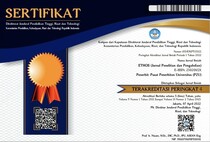Optimasi Iterasi dan Root Means Square (RMS) dalam Penentuan Batas Litologi dari Vertikal Elektrical Sounding (VES)
Abstract
Abstract. The absence of outcrops in the field will make it difficult to interpret geoelectric data. To be able to determine the lithological limit below the surface, a geoelectric resistivity method with a Schlumberger (Vertical Electrical Sounding) configuration with different iteration and Root Mean Square (RMS) is used. Measurements were made with 4 geoelectric points and at the first point 2 intersections were intersected with each stretch length of 50 meters. Data processing is done manually and continued using the PROGRESS software to interpret the data and adjust the iteration and Root Mean Square (RMS). Based on the results of the interpretation of the intersection between stretch 1 and stretch 2 depict the inside of the Top Soil and the iteration obtained will be a reference to interpret the next geoelectric data.
Keywords: Geoelectrical method, schlumberger configuration, iteration, RMS
Abstrak. Tidak terdapatnya singkapan dilapangan akan membuat kesulitan dalam menginterpretasi data geolistrik. Untuk dapat mengetahui batas litologi dibawah permukaan digunakan metode geolistrik tahanan jenis dengan konfigurasi schlumberger (Vertical Electrical Sounding) dengan perbedaan iterasi dan Root Mean Square (RMS). Pengukuran dilakukan dengan 4 titik geolistrik dan pada titik pertama dilakukan 2 bentangan secara berpotongan dengan masing – masing panjang bentangannya 50 meter. Pengolahan data dilakukan secara manual dan dilanjutkan menggunakan perangkat lunak PROGRESS untuk menginterpretasi data dan menyesuaikan iterasi dan Root Mean Square (RMS). Berdasarkan hasil interpretasi perpotongan antara bentangan 1 dan bentangan 2 menggambarkan kedalam dari Top Soil dan iterasi yang didapatkan akan menjadi acuan untuk menginterpretasi data geolistrik selanjutnya.
Kata Kunci : Metode geolistrik, konfigurasi schlumberger, Iterasi, RMS
Keywords
Full Text:
PDFReferences
Abu-Shariah. 2009. Determination of cave geometry by using a geoelectrical resistivity inverse model. Engineering Geologi 105 (2009) 239-244.
Dewashish Kumar, Shakeel Ahmed, N.S. Krishnamurthy, Benoit Dewandel. 2007. Reducing Ambiguities In Vertical Electrical Sounding Interpretations: A Geostatistical Application. Journal of Applied Geophysics, https://doi.org/10.1016/j.jappgeo.2006.07.001.
E. Faleiro, G. Asensio, J. Moreno. 2017. Improved measurements of the apparent resistivity for small depths in Vertical Electrical Soundings. Journal of Applied Geophysics 131, 117 – 122.
Loke, M.H., Chambers, J.E., Rucker, D.F., Kuras, O., Wilkinson, P.B., 2013. J. Appl. Geophys.95, 135–156
Samouelian, A., Cousin, I., Tabbagh, A., Bruand, A., Richard, G., 2005. Soil Tillage Res. 83,173–193.
V.S. Mogilatov. 2012. Formation of the macroanisotropic geoelectric parameters of a thin-layered geologic medium and the resolution of electrical prospecting. Russian Geology and Geophysics 53, 484-490.
DOI: https://doi.org/10.29313/ethos.v8i1.5058
Refbacks
- There are currently no refbacks.
Alamat Redaksi:
LPPM Unisba, Lantai 2, Jl. Purnawarman 63, Bandung 40116, Jawa Barat, (022) 4203368 , (022) 4264064. ethos.unisba@gmail.com / ethos@unisba.ac.id

This work is licensed under a Creative Commons Attribution-NonCommercial-ShareAlike 4.0 International License.














